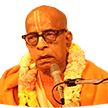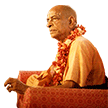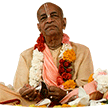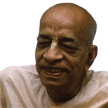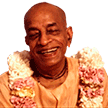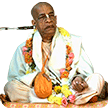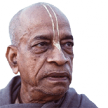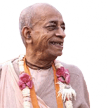Accepting the Body as the Self - an essential subject: Difference between revisions
(Created page with "Category:Essential Subjects <!----------------------- edit below this line -----------------------> <!------------------------ begin introduction text below --------------...") |
(Vanibot #0041: Moves Choose Another box to the end) |
||
| Line 2: | Line 2: | ||
<!----------------------- edit below this line -----------------------> | <!----------------------- edit below this line -----------------------> | ||
<!------------------------ begin introduction text below ------------------------> | <!------------------------ begin introduction text below ------------------------> | ||
A living entity becomes a victim of the material condition by foolishly accepting the body as one's self. Self-realization means to know that "I am not this body. I am spirit soul. I am part and parcel of God.” God is by nature eternal, joyful, and transcendental, never contaminated by the material energy. As His parts and parcels, we naturally seek an eternal life full of joy. As long as one accepts the body as oneself, one will remain in the clutches of material consciousness. Fatness, thinness, bodily and mental distress, thirst, hunger, fear, disagreement, desires for material happiness, old age, sleep, attachment for material possessions, anger, lamentation, and illusion are all transformations of the material covering of the spirit soul. A person can be saved from the fatigue of misidentifying the body with the self by taking shelter of Krishna. This begins by hearing from self-realized souls who distribute transcendental knowledge about the spiritual nature of the self and one’s relationship with Krishna. | |||
Srila Prabhupada's books, lectures, conversations and letters offer a comprehensive presentation of this essential subject as seen in the Vaniquotes '''[[Vaniquotes:Category:Accepting The Body As The Self|Accepting the Body as the Self ]]''' category. An introduction from his books is given below in the following | Srila Prabhupada's books, lectures, conversations and letters offer a comprehensive presentation of this essential subject as seen in the Vaniquotes '''[[Vaniquotes:Category:Accepting The Body As The Self|Accepting the Body as the Self ]]''' category. An introduction from his books is given below in the following 14 quotes. | ||
<!-------- end introduction text and don't touch next three lines ---------> | <!-------- end introduction text and don't touch next three lines ---------> | ||
== Quotes from Srila Prabhupada's books == | == Quotes from Srila Prabhupada's books == | ||
<!----------------- edit quote boxes below this line -----------------> | <!----------------- edit quote boxes below this line -----------------> | ||
{{VaniQuotebox| | {{VaniQuotebox|Everyone is engrossed with the idea of identifying the body or the mind with the self. As such, all knowledge disseminated in the material world is related either with the body or with the mind, and that is the root cause of all despondencies|In the material world everyone is engrossed with the idea of identifying the body or the mind with the self. As such, all knowledge disseminated in the material world is related either with the body or with the mind, and that is the root cause of all despondencies. '''(Śrīmad-Bhāgavatam 1.5.5)'''}} | ||
{{VaniQuotebox|The body is not the self, but animals and foolish people think that it is. Vivarta (illusion) does not, however, denote a change in the identity of the spirit soul; it is the misconception that the body is the self that is an illusion|The jīva, or living entity, is a spiritual spark who is part of the Supreme Personality of Godhead. Unfortunately, he thinks the body to be the self, and that misunderstanding is called vivarta, or acceptance of untruth to be truth. The body is not the self, but animals and foolish people think that it is. Vivarta (illusion) does not, however, denote a change in the identity of the spirit soul; it is the misconception that the body is the self that is an illusion. '''(Caitanya-caritāmṛta, Ādi-līlā 7.123)'''}} | |||
{{VaniQuotebox|Although the living entity is constitutionally conversant with the spiritual energy, or has the potency to understand it, he is covered by the material energy and consequently believes himself to be the body|Kṛṣṇa describes the body as the field of activities and the living entity as the kṣetra-jña, the knower of that field. Although the living entity is constitutionally conversant with the spiritual energy, or has the potency to understand it, he is covered by the material energy and consequently believes himself to be the body. This false identification is called "false ego." Deluded by the false ego, the bewildered living entity in material existence passes through different bodies and suffers various kinds of miseries. '''(Teachings of Lord Caitanya, Chapter 3)'''}} | {{VaniQuotebox|Although the living entity is constitutionally conversant with the spiritual energy, or has the potency to understand it, he is covered by the material energy and consequently believes himself to be the body|Kṛṣṇa describes the body as the field of activities and the living entity as the kṣetra-jña, the knower of that field. Although the living entity is constitutionally conversant with the spiritual energy, or has the potency to understand it, he is covered by the material energy and consequently believes himself to be the body. This false identification is called "false ego." Deluded by the false ego, the bewildered living entity in material existence passes through different bodies and suffers various kinds of miseries. '''(Teachings of Lord Caitanya, Chapter 3)'''}} | ||
{{VaniQuotebox|How a living entity becomes a victim of the material condition is lucidly explained in this verse. The beginning is to misidentify the body as one's self|How a living entity becomes a victim of the material condition is lucidly explained in this verse. The beginning is to misidentify the body as one's self. Therefore Bhagavad-gītā begins with the spiritual instruction that one is not the body, but is within the body. This consciousness can be possible only if one chants the holy name of Kṛṣṇa, the Hare Kṛṣṇa mahā-mantra, and always keeps oneself in the association of devotees. This is the secret of success. Therefore we stress that one should chant the holy name of the Lord. '''(Śrīmad-Bhāgavatam 6.2.36)'''}} | {{VaniQuotebox|How a living entity becomes a victim of the material condition is lucidly explained in this verse. The beginning is to misidentify the body as one's self|How a living entity becomes a victim of the material condition is lucidly explained in this verse. The beginning is to misidentify the body as one's self. Therefore Bhagavad-gītā begins with the spiritual instruction that one is not the body, but is within the body. This consciousness can be possible only if one chants the holy name of Kṛṣṇa, the Hare Kṛṣṇa mahā-mantra, and always keeps oneself in the association of devotees. This is the secret of success. Therefore we stress that one should chant the holy name of the Lord. '''(Śrīmad-Bhāgavatam 6.2.36)'''}} | ||
{{VaniQuotebox|When a living entity forgets the constitutional nature of his relationship with God, he is at once overwhelmed by the external energy. This is the cause of his false ego, his false identification of the body with the self|A godless concept of life is māyā. One who is actually learned in the Vedic literatures surrenders unto the Supreme Lord with great devotion and accepts Him as the supreme goal. When a living entity forgets the constitutional nature of his relationship with God, he is at once overwhelmed by the external energy. This is the cause of his false ego, his false identification of the body with the self. Indeed, his whole conception of the material universe arises from this false identification with the body, for he becomes attached to the body and its by-products. '''(Teachings of Lord Caitanya, Chapter 4)'''}} | |||
{{VaniQuotebox|The symptoms of the self-realized person are given herein. The first symptom is that he is not illusioned by the false identification of the body with his true self. He knows perfectly well that he is not this body|The symptoms of the self-realized person are given herein. The first symptom is that he is not illusioned by the false identification of the body with his true self. He knows perfectly well that he is not this body, but is the fragmental portion of the Supreme Personality of Godhead. He is therefore not joyful in achieving something, nor does he lament in losing anything which is related to his body. This steadiness of mind is called sthira-buddhi, or self-intelligence. '''(Bhagavad-gītā 5.20)'''}} | {{VaniQuotebox|The symptoms of the self-realized person are given herein. The first symptom is that he is not illusioned by the false identification of the body with his true self. He knows perfectly well that he is not this body|The symptoms of the self-realized person are given herein. The first symptom is that he is not illusioned by the false identification of the body with his true self. He knows perfectly well that he is not this body, but is the fragmental portion of the Supreme Personality of Godhead. He is therefore not joyful in achieving something, nor does he lament in losing anything which is related to his body. This steadiness of mind is called sthira-buddhi, or self-intelligence. '''(Bhagavad-gītā 5.20)'''}} | ||
{{VaniQuotebox| | {{VaniQuotebox|Detached person naturally prefers to live in a secluded place, he does not eat more than what he requires, and he controls the activities of his body and mind. He has no false ego because he does not accept the body as himself|A detached person naturally prefers to live in a secluded place, he does not eat more than what he requires, and he controls the activities of his body and mind. He has no false ego because he does not accept the body as himself. Nor has he a desire to make the body fat and strong by accepting so many material things. Because he has no bodily concept of life, he is not falsely proud. He is satisfied with everything that is offered to him by the grace of the Lord, and he is never angry in the absence of sense gratification. '''(Bhagavad-gītā 18.51-53)'''}} | ||
{{VaniQuotebox|One who is spiritually situated does not think that he is the body. Therefore he can transcendentally execute severe penances in the renounced order of life. The best example of such renunciation is Raghunatha dasa | {{VaniQuotebox|One who is spiritually situated does not think that he is the body. Therefore he can transcendentally execute severe penances in the renounced order of life. The best example of such renunciation is Raghunatha dasa Gosvami| One who is spiritually situated does not think that he is the body. Therefore he can transcendentally execute severe penances in the renounced order of life. The best example of such renunciation is Raghunātha dāsa Gosvāmī. '''(Caitanya-caritāmṛta, Antya-līlā 6.314)'''}} | ||
{{VaniQuotebox|Only when a conditioned soul accepts the body as himself does he feel the effects of chastisement or praise. Then he determines one person to be his enemy and another his friend and wants to chastise the enemy and welcome the friend|Only when a conditioned soul accepts the body as himself does he feel the effects of chastisement or praise. Then he determines one person to be his enemy and another his friend and wants to chastise the enemy and welcome the friend. This creation of friends and enemies is a result of one's bodily conception of life. '''(Śrīmad-Bhāgavatam 7.1.24)'''}} | {{VaniQuotebox|Only when a conditioned soul accepts the body as himself does he feel the effects of chastisement or praise. Then he determines one person to be his enemy and another his friend and wants to chastise the enemy and welcome the friend|Only when a conditioned soul accepts the body as himself does he feel the effects of chastisement or praise. Then he determines one person to be his enemy and another his friend and wants to chastise the enemy and welcome the friend. This creation of friends and enemies is a result of one's bodily conception of life. '''(Śrīmad-Bhāgavatam 7.1.24)'''}} | ||
| Line 28: | Line 32: | ||
{{VaniQuotebox|The tenth offense is to be attached to the misconception of possessing something, or to accept the body as one's self, while executing the process of spiritual cultivation|The tenth offense is to be attached to the misconception of possessing something, or to accept the body as one's self, while executing the process of spiritual cultivation.When one is free from all ten of these offenses in chanting the holy name of God, he develops the ecstatic bodily features called pulakāśru. Pulaka means "symptoms of happiness," and aśru means "tears in the eyes." The symptoms of happiness and tears in the eyes must appear in a person who has chanted the holy name offenselessly. '''(Śrīmad-Bhāgavatam 3.15.25)'''}} | {{VaniQuotebox|The tenth offense is to be attached to the misconception of possessing something, or to accept the body as one's self, while executing the process of spiritual cultivation|The tenth offense is to be attached to the misconception of possessing something, or to accept the body as one's self, while executing the process of spiritual cultivation.When one is free from all ten of these offenses in chanting the holy name of God, he develops the ecstatic bodily features called pulakāśru. Pulaka means "symptoms of happiness," and aśru means "tears in the eyes." The symptoms of happiness and tears in the eyes must appear in a person who has chanted the holy name offenselessly. '''(Śrīmad-Bhāgavatam 3.15.25)'''}} | ||
{{VaniQuotebox| | {{VaniQuotebox|For those grossly engaged in identifying the body as the self, pious activity, or karma-yoga, is recommended. For those who identify the mind with the self, philosophical speculation, or jnana-yoga, is recommended|For those grossly engaged in identifying the body as the self, pious activity, or karma-yoga, is recommended. For those who identify the mind with the self, philosophical speculation, or jñāna-yoga, is recommended. But devotees standing on the spiritual platform have no need of such material conceptions of adulterated devotion. '''(Caitanya-caritāmṛta, Ādi-līlā 4.21-22)'''}} | ||
{{VaniQuotebox|Misguided persons, who are interested in the mundane affairs of philanthropic and altruistic work under the misconception of the body as the self, could better take advantage of the Mahabharata| The real purpose of Vedānta-sūtra is explained by the author himself in the Śrīmad-Bhāgavatam, and anyone trying to understand Vedānta-sūtra without reference to Śrīmad-Bhāgavatam is certainly misguided. Such misguided persons, who are interested in the mundane affairs of philanthropic and altruistic work under the misconception of the body as the self, could better take advantage of the Mahābhārata, which was specifically compiled by Śrīla Vyāsadeva for their benefit. '''(Śrīmad-Bhāgavatam 3.5.12)'''}} | {{VaniQuotebox|Misguided persons, who are interested in the mundane affairs of philanthropic and altruistic work under the misconception of the body as the self, could better take advantage of the Mahabharata| The real purpose of Vedānta-sūtra is explained by the author himself in the Śrīmad-Bhāgavatam, and anyone trying to understand Vedānta-sūtra without reference to Śrīmad-Bhāgavatam is certainly misguided. Such misguided persons, who are interested in the mundane affairs of philanthropic and altruistic work under the misconception of the body as the self, could better take advantage of the Mahābhārata, which was specifically compiled by Śrīla Vyāsadeva for their benefit. '''(Śrīmad-Bhāgavatam 3.5.12)'''}} | ||
{{VaniQuotebox| | {{VaniQuotebox|He (Lord Krsna) is not as easily accessible to mental speculators, to those striving for self-realization by severe austerities and penances, or to those who consider the body the same as the self|The Supreme Personality of Godhead, Kṛṣṇa, the son of mother Yaśodā, is accessible to devotees engaged in spontaneous loving service, but He is not as easily accessible to mental speculators, to those striving for self-realization by severe austerities and penances, or to those who consider the body the same as the self. '''(Śrīmad-Bhāgavatam 10.9.21)'''}} | ||
<!----------------- edit quote boxes above this line -----------------> | <!----------------- edit quote boxes above this line -----------------> | ||
'''Accepting The Body As The Self- [[Vaniquotes:Category:Accepting | '''Accepting The Body As The Self- [[Vaniquotes:Category:Accepting The Body As The Self|explore more within this category]]'''. | ||
{{EsentialSubjectTotal}} | |||
{{ | <div style="float:left;"> | ||
{{EssentialSubjectnav}} | |||
</div> | |||
__NOTOC__ | __NOTOC__ | ||
__NOEDITSECTION__ | __NOEDITSECTION__ | ||
Latest revision as of 15:42, 22 November 2020
A living entity becomes a victim of the material condition by foolishly accepting the body as one's self. Self-realization means to know that "I am not this body. I am spirit soul. I am part and parcel of God.” God is by nature eternal, joyful, and transcendental, never contaminated by the material energy. As His parts and parcels, we naturally seek an eternal life full of joy. As long as one accepts the body as oneself, one will remain in the clutches of material consciousness. Fatness, thinness, bodily and mental distress, thirst, hunger, fear, disagreement, desires for material happiness, old age, sleep, attachment for material possessions, anger, lamentation, and illusion are all transformations of the material covering of the spirit soul. A person can be saved from the fatigue of misidentifying the body with the self by taking shelter of Krishna. This begins by hearing from self-realized souls who distribute transcendental knowledge about the spiritual nature of the self and one’s relationship with Krishna.
Srila Prabhupada's books, lectures, conversations and letters offer a comprehensive presentation of this essential subject as seen in the Vaniquotes Accepting the Body as the Self category. An introduction from his books is given below in the following 14 quotes.
Quotes from Srila Prabhupada's books
Accepting The Body As The Self- explore more within this category.
Vanipedia has now over 903 introductory articles compiled from Srila Prabhupada's books under the series titled Essential Subjects. All these articles can be seen in the Table of Content on the right side of this article and also here in this Umbrella Category. Browse through them to relish the breadth and depth of Srila Prabhupada's teachings - There is a subject for everyone.


